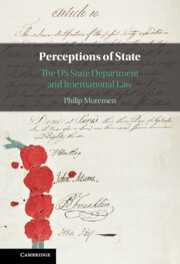Book contents
- Perceptions of State
- Perceptions of State
- Copyright page
- Contents
- Tables
- Preface and Acknowledgments
- 1 Introduction
- 2 Background Literature
- 3 State Compliance with International Law
- 4 Compliance by the United States
- 5 The Role of International Law in State Department Policymaking
- 6 The Trump Administration and International Law in the State Department
- 7 Conclusion
- Appendix Interview Subjects
- Index
2 - Background Literature
Published online by Cambridge University Press: 07 June 2024
- Perceptions of State
- Perceptions of State
- Copyright page
- Contents
- Tables
- Preface and Acknowledgments
- 1 Introduction
- 2 Background Literature
- 3 State Compliance with International Law
- 4 Compliance by the United States
- 5 The Role of International Law in State Department Policymaking
- 6 The Trump Administration and International Law in the State Department
- 7 Conclusion
- Appendix Interview Subjects
- Index
Summary
Chapter Two summarizes the compliance literature on international relations and international law, addressing both theoretical and empirical work. This literature can be divided into two groups: The first group explores why states comply with international law and is generally associated with the primary schools of international relations theory. The study may confirm or illustrate the applicability of aspects of one or more of these theories, although that is not necessary for it to be valuable in illuminating the motivations that affect policymakers and states. The second group within the compliance literature examines more closely how states comply at the domestic level and focuses on domestic policymaking within the United States government. In this regard, the chapter concentrates on two similar normative and process-oriented approaches. The first, the international legal process approach, is drawn from international legal scholarship; the second is primarily drawn from constructivist international relations theory, and was developed primarily by Wayne Sandholtz and Christopher Whytock, among others. Both approaches emphasize the role of internalized norms and the importance of process and organizational structure in decision-making. They are, accordingly, helpful in understanding the effect of legal norms, lawyers, and process in State Department decision-making.
Keywords
- Type
- Chapter
- Information
- Perceptions of StateThe US State Department and International Law, pp. 24 - 64Publisher: Cambridge University PressPrint publication year: 2024

